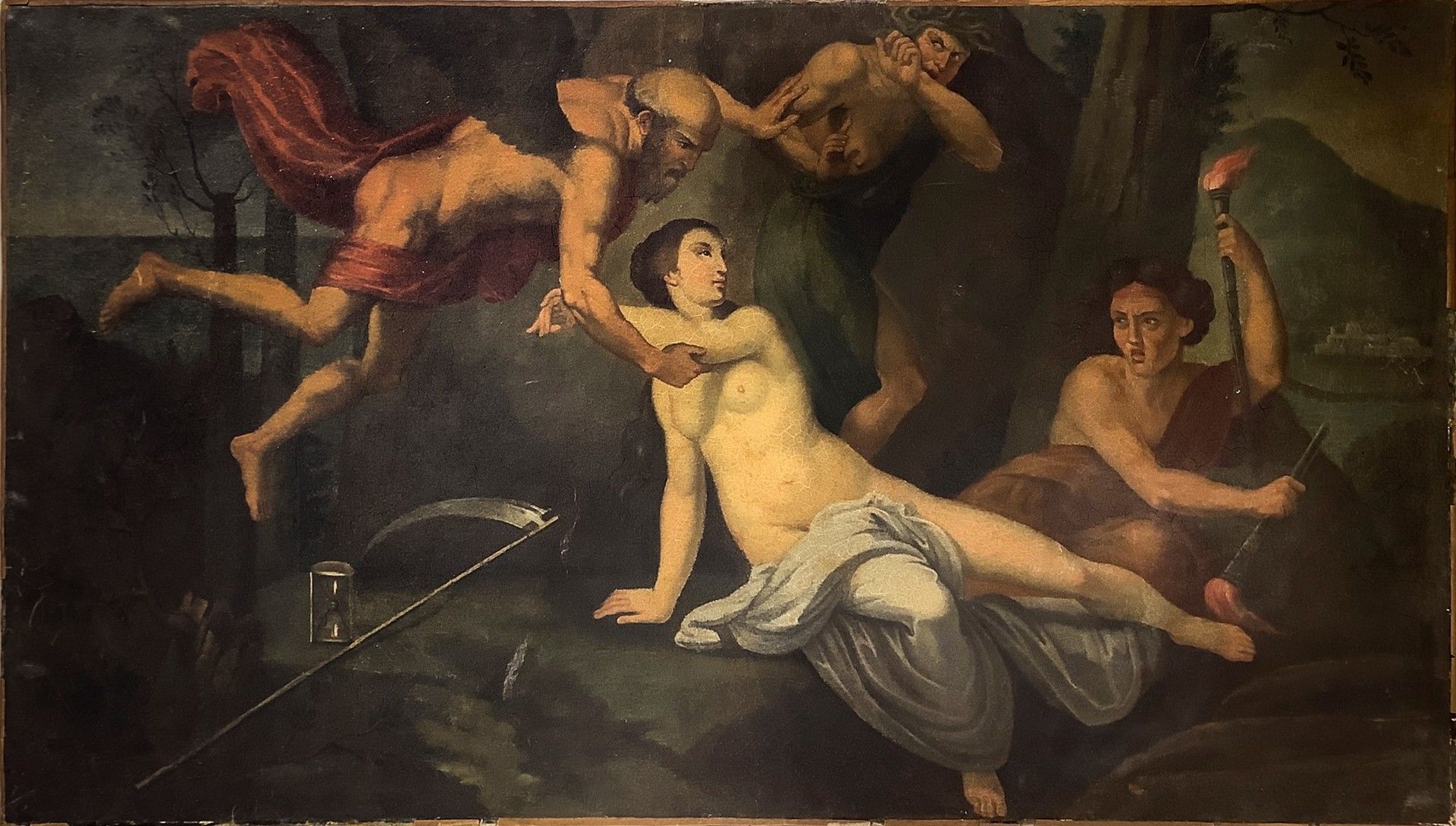Description
Allegory of time , XVIII century Oil painting on canvas h 60x110 cm Through a careful observation of the figures present, it is possible to correctly read the mythological scene, distributed horizontally in the compositional space. In a dark bush that leads into the sea, an elderly bearded and winged man is intent on grabbing a young woman by the arm and at the same time rejecting a male figure, while another female figure occupies the right side of the canvas. The unique iconography will be read from left to right: the fiery image of the winged man, covered only by a fluttering red cloth, is nothing more than the allegory of Time, flanked by the scythe and hourglass, symbols of the transience of life. Time discovers the limpid Truth, whose forms correspond to those of a candid naked woman, pushing away the Lie, personified by a young man with a frowning expression as a sign of defeat. But how to decree the definitive defeat of the deceptions carried by that young man with the head covered with snakes, as if he were one of the gorgons of Greek mythology? The female figure that closes the theatrical scene on the side is the allegory of Justice, which contains a double iconological meaning: on the one hand it turns the torch upwards, making evident the triumph of Truth and indicating its power like the flame of fire; on the other hand, it is recalled that sometimes the Lie can triumph over the crystalline Truth through the second torch, projected downwards. & nbsp; & nbsp; & nbsp; & nbsp; & nbsp; & nbsp; & nbsp; & nbsp; & nbsp; & nbsp; & nbsp; & nbsp; & nbsp; & nbsp; & nbsp; & nbsp; & nbsp; & nbsp; & nbsp; & nbsp; & nbsp; & nbsp; & nbsp; & nbsp; & nbsp; & nbsp; & nbsp; & nbsp; & nbsp; & nbsp; & nbsp; & nbsp; & nbsp; & nbsp; In conclusion, the Allegory of Time can be considered the work of an artist from southern Italy, active in the last decades of the eighteenth century. & Nbsp; & nbsp; ASORstudio & nbsp; & nbsp; & nbsp; & nbsp; & nbsp; & nbsp; & nbsp; & nbsp; & nbsp; & nbsp; & nbsp; & nbsp; & nbsp; & nbsp; & nbsp; & nbsp; & nbsp; & nbsp; & nbsp; & nbsp; & nbsp; & nbsp; & nbsp; & nbsp; & nbsp; & nbsp; & nbsp; & nbsp; & nbsp; & nbsp; & nbsp; & nbsp; & nbsp; & nbsp; & nbsp; & nbsp; & nbsp; & nbsp; & nbsp; & nbsp; & nbsp; & nbsp; & nbsp; & nbsp; & nbsp; & nbsp; & nbsp; & nbsp; & nbsp; & nbsp; & nbsp; & nbsp; & nbsp; & nbsp; & nbsp; & nbsp; & nbsp; & nbsp; & nbsp;
68
Allegory of time , XVIII century Oil painting on canvas h 60x110 cm Through a careful observation of the figures present, it is possible to correctly read the mythological scene, distributed horizontally in the compositional space. In a dark bush that leads into the sea, an elderly bearded and winged man is intent on grabbing a young woman by the arm and at the same time rejecting a male figure, while another female figure occupies the right side of the canvas. The unique iconography will be read from left to right: the fiery image of the winged man, covered only by a fluttering red cloth, is nothing more than the allegory of Time, flanked by the scythe and hourglass, symbols of the transience of life. Time discovers the limpid Truth, whose forms correspond to those of a candid naked woman, pushing away the Lie, personified by a young man with a frowning expression as a sign of defeat. But how to decree the definitive defeat of the deceptions carried by that young man with the head covered with snakes, as if he were one of the gorgons of Greek mythology? The female figure that closes the theatrical scene on the side is the allegory of Justice, which contains a double iconological meaning: on the one hand it turns the torch upwards, making evident the triumph of Truth and indicating its power like the flame of fire; on the other hand, it is recalled that sometimes the Lie can triumph over the crystalline Truth through the second torch, projected downwards. & nbsp; & nbsp; & nbsp; & nbsp; & nbsp; & nbsp; & nbsp; & nbsp; & nbsp; & nbsp; & nbsp; & nbsp; & nbsp; & nbsp; & nbsp; & nbsp; & nbsp; & nbsp; & nbsp; & nbsp; & nbsp; & nbsp; & nbsp; & nbsp; & nbsp; & nbsp; & nbsp; & nbsp; & nbsp; & nbsp; & nbsp; & nbsp; & nbsp; & nbsp; In conclusion, the Allegory of Time can be considered the work of an artist from southern Italy, active in the last decades of the eighteenth century. & Nbsp; & nbsp; ASORstudio & nbsp; & nbsp; & nbsp; & nbsp; & nbsp; & nbsp; & nbsp; & nbsp; & nbsp; & nbsp; & nbsp; & nbsp; & nbsp; & nbsp; & nbsp; & nbsp; & nbsp; & nbsp; & nbsp; & nbsp; & nbsp; & nbsp; & nbsp; & nbsp; & nbsp; & nbsp; & nbsp; & nbsp; & nbsp; & nbsp; & nbsp; & nbsp; & nbsp; & nbsp; & nbsp; & nbsp; & nbsp; & nbsp; & nbsp; & nbsp; & nbsp; & nbsp; & nbsp; & nbsp; & nbsp; & nbsp; & nbsp; & nbsp; & nbsp; & nbsp; & nbsp; & nbsp; & nbsp; & nbsp; & nbsp; & nbsp; & nbsp; & nbsp; & nbsp;
